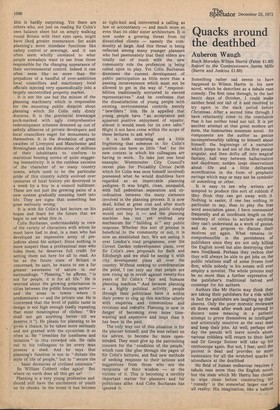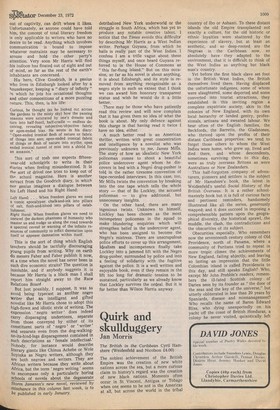Quacks around the deathbed
Auberon Waugh
Black Marsden Wilson Harris (Faber £1.80) Report to the Commissioners James Mills (Barrie and Jenkins £1.80)
Something rather sad seems to have happened to Wilson Harris in his new novel, which he describes as a tabula rasa comedy. The first time through, in the last hectic days of October, I could make neither head nor tail of it and resolved to try again in the slack period before Christmas. After a second time through I have reluctantly come to the conclusion that it has neither head nor tail. It is yet another attempt at that great modern art form, the humourless nonsense novel. Its components are the author as genius incomprehensibly talking to himself about himself: the beginnings of a narrative which jumps in and out of the first person singular, and then drifts off into magical fantasy, half way between hallucination and daydream; sudden inept observations about life and a little deliberate mystification in the form of prophetic ravings which may or may not be symbolic of something or other.
It is easy to see why writers are tempted to produce this sort of rubbish if they think they can get away with it Nothing is easier, if one has nothing in particular to say, than to play the free word association game. I have commented frequently and at inordinate length on the tendency of critics to acclaim anything they can't understand as a work of genius, and do not propose to discuss their motives yet again. What remains incomprehensible is the persistence of publishers since they are not only killing the English novel but also destroying their nwn livelihood. Perhaps they reckon that they will always be able to get jobs on the public relations staff of some frozen fond firm, while nobody in his senses will ever employ a novelist. The whole process may be no more than a further expression of the publisher's traditional hatred and contempt for his authors.
Authors like Mr Harris may think they are taking their publishers for a ride while in fact the publishers are laughing up their sleeves. Only the poor moronic reviewers sit down week after week and pretend to discern some meaning in a pathetic attempt to prove themselves as intelligent and artistically sensitive as the next man and keep their jobs. Ah well, perhaps one day the pseuds will leave novels alone, various cobblers will return to their lasts and Dr George Steiner will take up his stethoscope again. But not, I fear, until the patient is dead and provides no more sustenance for all the wretched quacks attendance at the deathbed No field of human endeavour requires a tabula rasa more than the English novel, but the slate which Mr Harris has chosen to wipe clean before constructing his ' comedy' is the somewhat larger one cf all reality. His imagination, like a balloon
out of captivity, can drift where it likes. Unfortunately, as anyone could have told him, the concept of total literary freedom is only applicable to writers who have no desire to be read. Anything which involves communication is bound to impose whatever restraints may be necessary to arouse and hold the other party's attention. Very soon Mr Harris will find his balloon has floated out of sight and out of mind, so far as the rest of the earth's,. inhabitants are concerned.
His hero, Clive Goodrich, is a genius who lives in Edinburgh looked after by a housekeeper, keeping a "diary of infinity" in which he jots his occasional thoughts and other compositions of a more puzzling nature. This, then, is his life:
Curious, he thought (as he looked out across the gardens to the misty sky) how the passing seasons were saturated by one's dreams and turn into half-fossil, half-cradle — endless deceiving, revealing subjective/objective fabric or open-ended bias. He wrote in his diary: " Open-ended ironical flesh of nature or fabric of things into axe; open-ended ironical fabric of things or flesh of nature into scythe; open ended ironical tunnel of mist into a shield for an assassin."
This sort of tosh one expects fifteenyear-old schoolgirls to write in their diaries when feeling misunderstood. It is rhe sort of drivel one tries to keep out of tlIP school magazine. Here is another extract from the Goodrich diary, in which Our genius imagines a dialogue between his Left Hand and his Right Hand:
Left Hand: . . . When freedom glares we need a comic apocalypse: chalkand-ink into pillars of salt, flesh-and-blood into pillars of establishment.
Right Hand: When freedom glares we need to unravel the darkest phantoms of humanity who master us and nudge us along the road towards a spectral caveat or warning of the infinite resources of community to inflict damnation upon itself or appease damnation within itself.
This is the sort of thing which English teachers should be tactfully discouraging Young pupils from writing. Why on earth do messrs Faber and Faber publish it now, at a time when the novel has never been in such dire economic straits? The question is insoluble, and if anybody suggests it is because Mr Harris is a black man I shall report him straight away to the Race Relations Board But just possibly, I suppose, It was to avoid being typecast as another negro Writer that an intelligent and gifted novelist like Mr Harris chose to adopt this high-flown and idiotic style of writing. The expression negro writer' does indeed carry disparaging undertones, separate from those conveyed by either of its constituent Darts of 'negro' or ' writer ' and separate even from the dog-walkingon-its-hind-legs disparagement contained in such descriptions as ' female intellectual.' Nobody, for instance would describe literary giants like Chinua Achebe or Wole Soyinka as Negro writers, although they are both negroes and writers. They are African writers because they write about Africa, but the term 'negro writing' seems to encompass only a particularly boring schools of novels about the degenerate
Storm Jameson's new novel, reviewed by mischance in this column last week, is to be published in early January.
detribalised New York underworld or the struggle in South Africa, which has yet to
produce any notable creative talent. I notice that the Times avoids this difficulty by describing Mr Harris as a West Indian
writer. Perhaps Guyana, from which he hails is really part of the West Indies. I confess I am a trifle vague about these things myself, and once heard Guyana re ferred to in the House of Commons as "this far-flung island." But on this occa sion, so far as his novel is about anything, it is about Edinburgh, and its style is removed from anything recognisable as a negro style to such an extent that I think we can award him honorary transparent status and wish he would do it a little better.
There may be those who have patiently read this review and will now complain that it has given them no idea of what the book is about. My only defence against this charge is that having read it twice I have no idea, either.
A much better read is an American thriller, written with great concentration and intelligence by a novelist who was previously unknown to me, James Miffs. The story of how an idealistic New York policeman comes to shoot a beautiful police undercover agent whom he discovers in bed with a Negro drug-pusher is told in the rather tiresome convention of tape-recorded interviews. In this case, too, Mr Mills twists the convention by breaking into the one tape which tells the whole story — that of Bo Lockley, the accused policeman — to give additional, but unnecessary insights.
On the other hand, there are many ingenious twists. Unknown to himself, Lockley has been chosen as the most incompetent policeman in the squad to make blundering enquiries which will strengthen belief in the undercover agent, who has been assigned to become the Negro's mistress. There are unscrupulous police efforts to cover up this arrangement.
Idealism and incompetence finally take Lockley into a jammed lift with the Negro drug-pusher, surrounded by police and into a feeling of solidarity with the fugitive against the police. It is a well written and enjoyable book, even if they remain in the lift too long for dramatic tension to be sustained, particularly as we already know that Lockley survives the ordeal. But it is far better than Wilson Harris anyway.











































 Previous page
Previous page